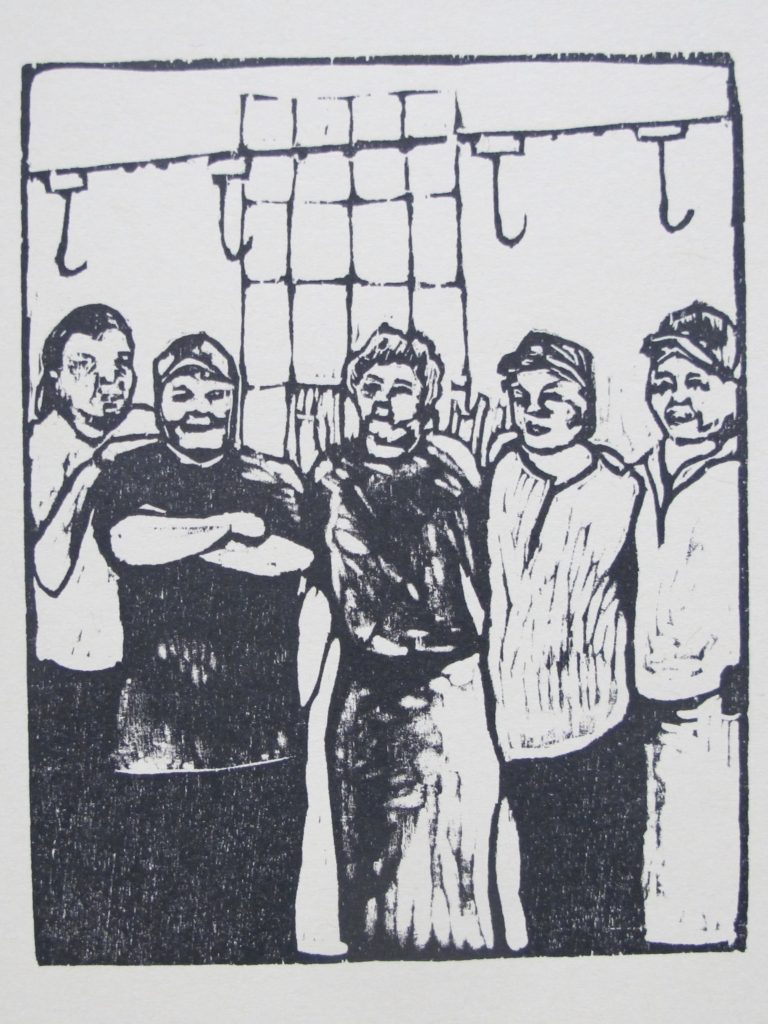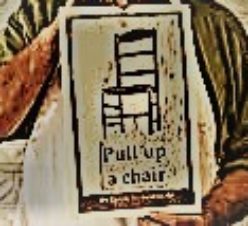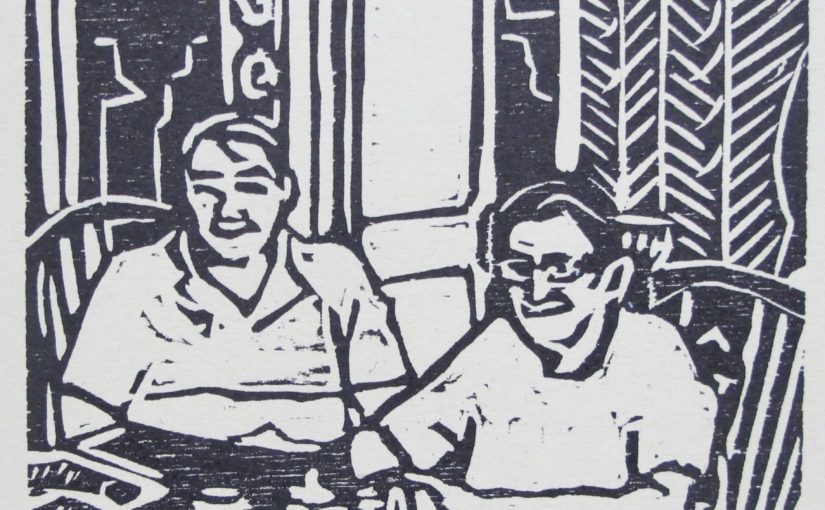“It’s hard because I was used to getting up in the morning and going to work and being around people. Now the whole routine, it changed. I mean in the beginning it was nice, I got to sleep in a little later, go out on the porch, have a coffee, come in and putter around the house. That was fun for a while because I caught up on different things, little projects around the house, like I could actually clean my refrigerator. I can actually really dust instead of just flicking it around. It was fun at first, kinda relaxing, but then as the days go by, I need to get out and do something. I don’t feel like I’m being productive, I wanna go to work and bring a paycheck home, contribute. Now I’m just sitting at home.”
– Dale Lucier, White Sanding, Chairs. Nichols & Stone employee 33 years
“Yeah, it’s strange… think about the number of mornings I went in there… 28 years, you know, 250 days a year or whatever. This morning you don’t have to get up, tomorrow you don’t have to get up to go in. Not good.”
– Richard Beauregard, Mill Room Lead Person. Nichols & Stone employee 28 years
“Yeah, I think it took you a while to realize when you weren’t getting up in the morning to get ready to go to work.”
– Millie Beauregard, Chair Finishing. Nichols & Stone employee 21 years
Reading interviews from the Chair City Oral History Book Series, I can imagine these same words being spoken today about life in the current COVID-19 crisis. But these were reflections recorded in 2009 about the 2008 financial crisis, when the Nichols & Stone furniture factory closed. Looking at the twelve interviews included in the Book Series it is easy to find quotes that might help us reflect on the current situation.
We probably don’t need any reminders about the value of the sense of community we obtain from and at our places of work. Dale, who worked at Nichols & Stone for 33 years talked about how she’d go in early just to have time to catch up with her co-workers.
“I enjoyed going in every morning. My husband could never understand why I went in early, work didn’t start ‘til 7. I like going in there and just sitting down at my bench, drinking my coffee, watching the people come in. You know waiting to hear different little stories of what happened to them over the weekend, ‘cause there was always a story to be told. A lot of people got there, not as early as I did, but would come in just to mingle and converse a little before you had to start your job. Everybody knew everybody.”
– Dale Lucier

My job was a big part of my life. It was a growing-up experience for me. It was my second real job that I’ve ever had, and being there so many years… with wonderful people… the people you work with know more about you and you spend more time with them than you do your own family you live with. I liked it there. I loved the people.”
– Kathy Cassavant, Administrative Assistant. Nichols & Stone employee 19 years.
“When you work that many years with a lot of the same people, you spend more time with them than you do your own family. You get up in the morning – family’s still sleeping – you go out of the house, you don’t come home until 5 or 6 at night. You spend a couple hours with your family, go back to bed.”
– Denis Boucher, Plant Manager. Nichols & Stone employee 31 years.
Many of those interviewed for the project talked about how emotional that time was.
“It felt like somebody ripped my heart out of my chest. It was like somebody had died. It was like comin’ out of a funeral. We were just walking with our heads down, goin’ ‘Now what are we going to do? What’s going to happen to us?’ [Everyone went back] to our stations and back to work and did their jobs. We kept working, but you could see everybody was thinking. It was not good. And then as the weeks went by, people would get laid off… and then a few more, and then a few more, and then next thing you know, there were like 8 of us left.
The last day when we finally finished everything, one of the women who was working with me… she was good through the whole thing, but that very last day she just lost it. She broke down. She was an older woman. Where’s she going to go? She’s been in that place forever. They say, ‘We’ll, you can get retrained; go somewhere else.’ At that age, do you want to. Insurance and stuff like that is important to older people. I felt so bad for her.”
– Barbara Suchocki. Finishing Supervisor, Table and Case. Nichols & Stone 19 1/2 years
“That was a roller coaster and a half. I was upset. A lot of people were starting to get edgy. Still didn’t believe I was going to get laid-off on the 20th. 2 weeks before I was being laid off I got real nerved up. What am I gonna do? One night I just started getting anxiety attacks and I was like, the heck with this. I just got the attitude like, something is going to happen, I’ll be alright. Because I’ve got the wife, 2 kids, house… you know?”
– Chuck Thompson, Topcoat and Finish, Table and Case. Nichols & Stone employee 18 1/2 years
A.J. reflects on what might have happened to him if he didn’t have a job to show up to, and in doing so hints at what others might be going through.
“I left Nichols & Stone on a Friday in September and started work at Stickley the following Monday. Not full time, and not forever, but you know, that was probably very good for me because I don’t think I would have done very well if I have just walked out the door and that was it. I think I’d have developed some very bad habits. Or I would have polished my very bad habits – that’s a better way of putting it.”
– A.J. Peterson, Vice President. Nichols & Stone employee for 27 years
In our current crisis most non-essential businesses are attempting to continue operations in some way, waiting until it is safe to re-open. But in many cases, decisions to close businesses happened over the course of one weekend. Today, few people are having to face both the loss of income and the reality that their work is gone forever. Still, I imagine that the process of figuring out how to comply with social distancing restrictions and how to do the least harm to people in a workplace has been really heart-wrenching for managers. Denis describes what it was like knowing that the lives of the people he worked with were about to be up-ended.
“We worked less hours, but it was more stressful. It was a different kind of stress. You start worrying about your job, what’s gonna happen? Then you start looking around at other people and you think, what is this person gonna do, she’s been here for 50 years. Some people, you know they’re gonna be okay, they’re young, they’re energetic, they’re gonna be OK. Others you look at and you are kinda worried about some of the people you worked with for a long time. It came home with you at the end of the day. It came home with you.
And some of the bad things about being in the management – you knew things you couldn’t say. Like when I knew they were closing and I couldn’t say it. Somebody says, ‘Hey are we gonna make it?’ ‘I hope so, we’re trying.’ You gotta always keep it positive. Even before they announced it, you knew how bad it was and you see somebody buy a new car or something. You’re like, ‘Don’t do it,’ but I can’t tell you, ‘Don’t buy a new car, because I don’t know how much longer we’re gonna be here.’ There were some unpleasant things about knowing.”
– Denis Boucher
In reading the reflections of former Nichols & Stone employees recorded in 2009 the sense of loss and isolation that they experienced penetrates in a visceral way – it is heartbreaking. While the disorientation that came with the loss of a workplace is strikingly similar to what many of us are experiencing today, some of us can remain hopeful that our work will re-open, that our workplaces are not permanently shuttered, nor have our livelihoods permanently disappeared. We are in a different kind of crisis right now, but of course many many people are out of work; we fear that many businesses in our communities may close permanently; most of us feel anxiety about the state of the economy and our own finances. We also know that whatever comes next will be different from life before we ever heard of COVID-19.
In the next dispatches, I’ll share parts of the interviews in the book series in which former furniture workers reflect on navigating unemployment and the post financial crisis economy, and in which they talk about the impact that factories closing had on the local economy.
This is a very challenging time for almost every single one of us and social isolation can make it even harder. If you are in distress, feeling the burden of this crisis in ways that are unbearable, please reach out. The number for the National Suicide Lifeline is 1-800-273-8255 and more information can be found at their website: suicidepreventionlifeline.org

